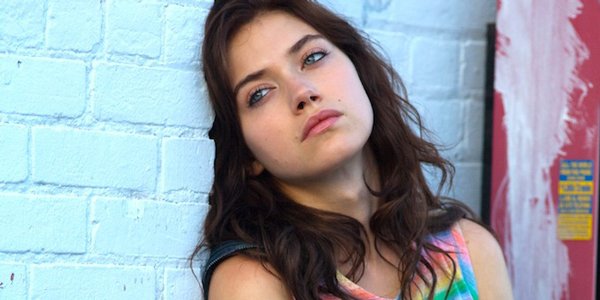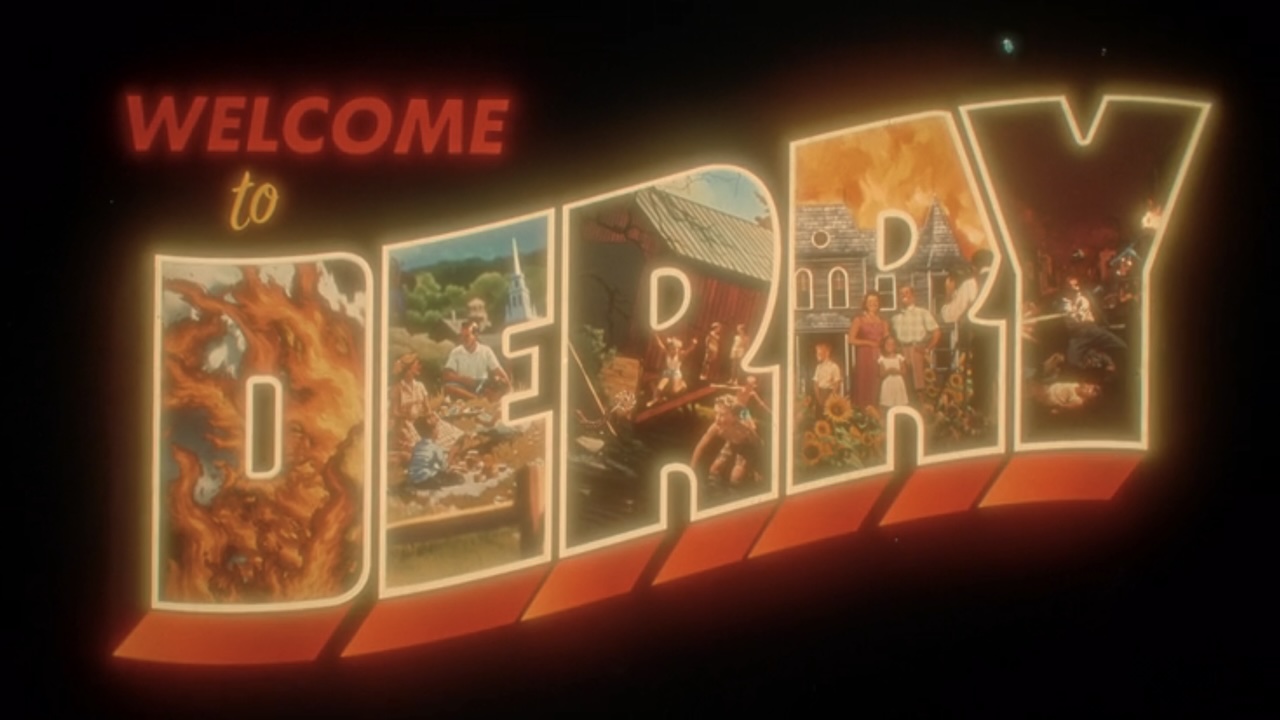Imogen Poots Talks 90s Fashion, Playing The Girlfriend, And The Mysteries Of Terrence Malick

It's not an easy thing to play the girlfriend. Hollywood history is littered with actresses who have been cast a few times opposite high-profile male co-stars, and who even started making a name for themselves, but were destined to fade after just a few shots at big-screen girlfriend status.
Imogen Poots, the 23-year-old British actress you may recognize from 28 Weeks Later or Jane Eyre, is on the rise, and that means-- you guessed it-- a lot of girlfriend parts. But in all of them, which includes the new film Greetings from Tim Buckley, you can see how she's making the most of it and turning these women not just into props for the male leads, but real characters. That's an especially hard job in Tim Buckley, in which Penn Badgley stars as a young Jeff Buckley, performing at a tribute concert for the father he barely knew, years before he would start his own music career and record the landmark album Grace. Poots plays a fictional character named Allie, a young woman helping put together the concert who falls for Jeff and accompanies him through his troubled journey into his own past with his father-- and, maybe, his bright (but brief) future.
The film is set in 1991, just 2 years after Poots was born, and I talked to her about getting into the film's 90s fashions and crafting Allie into a real person. She also talked happily about her work on three hugely exciting upcoming projects-- Are We Officially Dating? opposite Zac Efron, the video game adaptation Need for Speed with Aaron Paul, and the Terrence Malick project Knight of Cups, which she said was less like filming a movie and more like hanging out on a film set with Malick and Christian Bale for a week. Not too bad, right?
Greetings From Tim Buckley is currently in limited theaters and available on VOD; you can find out more about it here, and you can click here for my conversation with Poots's co-star Penn Badgley.
The fashion in this movie seems like exactly what people are wearing again. There’s like this weird cyclical thing.
I remember walking into the costume fitting for the movie and I was just like, “Yeah!” like I loved everything and I was pretty much wearing what they wanted us to be wearing. I think there’s just something so beautiful and dainty about the ‘90s stuff and then it’s juxtaposed with fucked up shit...
Because you’re not really quite old enough to remember that time, was there like a sense of discovery in there too, things from the early 90s you never would have known about because you were so young?
Your Daily Blend of Entertainment News
Exactly. It’s the weirdest thing. I remember the other day I put on like fishnets again or something or a shirt and I was like, “This feels so comfortable and familiar and I don’t know why,” but that’s why and it’s the same thing with music from that time. It just gets to you and you can’t deny it.
You’ve worked a lot and you’ve done a couple of period films. Is there something different when you’re going back into the recent past? Is there a different adjustment for that?
I think there is an adjustment for sure. As you said, I grew up during the 90s, but I really don’t remember much of it. It’s a thing where you can’t help but think to yourself, “Wow, this was happening when I was two. I was in the world when the story was taking place," and there’s a real magic to that because even though my character is fictional, that concert happened on that date in that church and then 21 years later, you’re going to be part of a film about it.
The girlfriend role is tricky all the time, but especially when you are in a story that’s about a real person, but your character is fictional. I think people can write those characters really thinly or they can just kind of be a stand in for the audience to help you learn about this guy. With this in particular and then for anything else, when you’re handed the girlfriend part, the love interest part that could be so thin, what do you do to make it interesting?
You could see, and I totally agree with this, that she is essentially a device to learn more about Jeff and bring that heartbeat to it in a very human way for the audience. She’s enigmatic in terms of where she’s actually from, but in terms of how she falls in love with him and how she wants to bring him out of himself, I think that’s something that speaks to you. And you just live that person’s life and you live their feelings and it was a real joy in way to just be like a voyeur in a sense to Penn’s Jeff. She was always on the sidelines in a way, but she’s always observing what’s going on, and I think you need that. When you’re playing somebody like Jeff Buckley, an icon, and so many people have their own opinions about him and you have to really make your mark on it. And I think it’s about playing the human and the boyfriend and the son and the father. It’s a way of making it real and so, in a way, once you’ve made it real, no one can take that away from you.
You're also playing a love interest in Are We Officially Dating. Is that a similar process of making the character real?
The story itself is fictional--I mean, the director wrote about his own experiences about his growing up time in New York--but in terms of being a love interest, you really never think about it that way. I think other people might, but I think you can kind of cheat yourself into making something very slim being transient, when actually a story like that, you can’t read too much into that. It’s a romance and it takes place in New York with kids post-college and it was something I wanted to be part of, because those characters, I recognize them. I’d seen them around and it was exciting to play that girl.
You work a lot, but I’m sure you turn down even more stuff. When you’re looking at four scripts in front of you where you’re playing the love interest or the girlfriend, how do you learn to figure out which one’s right for you?
There are some things that are just a no-brainers, like I did this film called A Late Quartet that had a phenomenal cast and that’s like you’re lucky enough to work with these guys. You have to go with your intuition and mistakes are made often when you don’t listen to that, when you listen to someone else. It’s really easy to do that, but no one else is going to know what’s on your mind when you go to sleep at night, so you’ve got to constantly make your own decisions otherwise you’re the one messing up.
t’s a funny thing and it’s a learning curve for sure and it’s never certain the choice you’re going to make is the right one, but you sort of have to live your life for you. I’m doing a film right now that I never would have expected I’d do, called Need for Speed. It’s based on a video game, which is crazy to me. I’m sort of like, “Do they know what they’ve done?” But I’m having a blast and I’ve never done anything like it before. If I could make movies about Jeff Buckley for the rest of my life, I would, but you want to have diversity too and that’s how you learn more and challenge yourself.
When you talk about trusting the director, I have to ask about Terrence Malick, because in one way it’s a slam dunk. he’s an amazing director. At the same time, when you’re an actor and you sign up for his movies, you agree that you don’t know how much you’re going to wind up in the final film and you do this acting and the final product is so different. How was it adjusting to that, since I assume even now you don’t know how much of the final movie you’ll be in.
Oh, absolutely. I never really think about Knight of Cups, “Oh, I made a movie with Terrence Malick.” It’s more like I went and hung out on one of his film sets for a week with Christian Bale, who’s an incredible actor and a wonderful person. That’s the way you really look at it because it’s such an experience. Just talking to someone like him is so important and he really kind of encourages curiosity, and I think if you go into something like that with an open mind, you know, there’s nothing to lose really. Of course, it’s different than something like a studio film. If you get cut out of that one, it’s really a huge problem.
I think you sign contracts that keep that from happening on something like Need for Speed.
Exactly, but with Malick, it’s far more, it’s a art form essentially and you do what you can and you have a great time and you learn and you try to be as generous as you can and have a blast.
Do you have to learn how to interact with the camera differently when you're working on his movies?
I think it’s just something you experience. It’s really something else working with him, because you don’t necessarily question it. You just go along with him and I think that’s the idea. That’s why people are so excited to work with him because you have to put yourself out on a limb, but it’s the same for anything in life. If you don’t fully commit to it, you kind of half-believe in it or something, it’s not authentic and then it kind of cheapens everything. I think he’s really about, you know, you take it as far as you want to take it and in terms of the actual film set and how it’s run, I think it’s different from set to set.
Staff Writer at CinemaBlend

